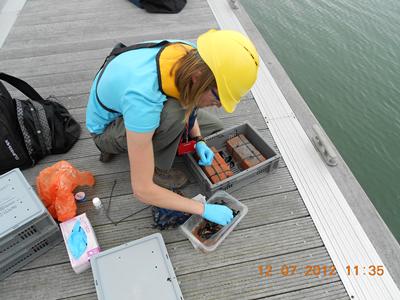My dissertation was on the assessment of metal pollution within Southampton Water using biomonitoring techniques.

Marine organisms that accumulate metals were analysed for metal tissue residues, as well as a protein known as metallothionein that is involved with detoxification. I focused on seaweeds, as researchers have largely ignored them in the past as potential bioindicators, despite their great potential. I also ‘actively sampled' mussels: transplanting organisms to sites with a range of pollution issues, and sampling them across seasons- my sites included a power station, a marina, an industrial complex and some unpolluted sites distant from industry. This technique was piloted for the first time in the area, and is useful as it reduces genetic variability and impending adaptive mechanisms of residential organisms, and makes sampling easier. The methodology used to measure metallothionein was also a novel technique that was applied for the first time to seaweed species. I worked closely with a Southampton PhD student from Egypt (Walid Aly) during my project- he assisted me in the laboratory and taught me the analytical methodology.
I found that copper pollution is of some concern close to recreational boating sites, such as marinas, due to the use of copper-based anti-fouling paints. Seaweed species were excellent indicators of this pollutant, exhibiting increased production of metallothionein, probably due to the inhibition of photosynthesis caused by copper. Active sampling methods with mussels also showed the effects of environmental conditions on metal accumulation in animal tissues, and metallothionein production as a physiological response to the pollutant load.
This project provided me with the skills and knowledge to be able to secure a PhD at the University of Southampton within this field. Seaweed species and active sampling techniques are being further explored to promote their use in future pollution monitoring programmes, and I am helping undergraduate students on project work in this area as well.
This project was supported by a grant from the Solent Forum Bursary Scheme.